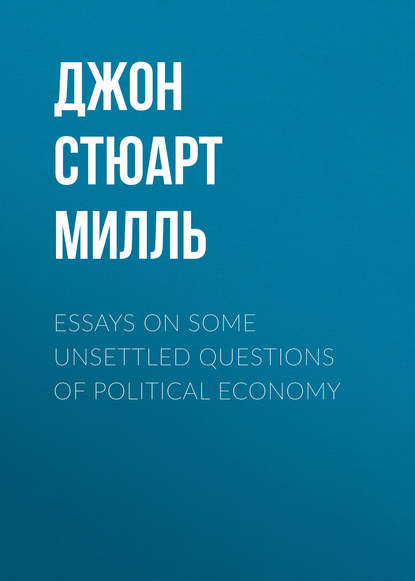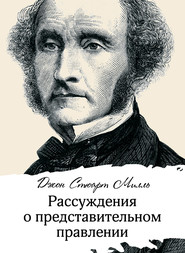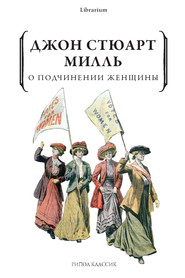По всем вопросам обращайтесь на: info@litportal.ru
(©) 2003-2025.
✖
Essays on some unsettled Questions of Political Economy
Настройки чтения
Размер шрифта
Высота строк
Поля
2. If the additional demand exceeds what can be supplied by setting at liberty the capital which exists in the state of unsold goods; and if the dealer has additional resources, which were productively invested (in the public funds, for instance), but not in his own trade; he is enabled to obtain, on a portion of these, not mere interest, but profit, and so to gain that difference between the rate of profit and the rate of interest, which may be considered as "wages of superintendance."
3. If all the dealer's capital is employed in his own trade, and no part of it locked up as unsold goods, the new demand affords him additional encouragement to save, by enabling his savings to yield him not merely interest, but profit; and if he does not choose to save (or until he shall have saved), it enables him to carry on an additional business with borrowed capital, and so gain the difference between interest and profit, or, in other words, to receive wages of superintendance on a larger amount of capital.
This, it will be found, is a complete account of all the gains which a dealer in any commodity can derive from an accession to the number of those who deal with him: and it is evident to every one, that these advantages are real and important, and that they are the cause which induces a dealer of any kind to desire an increase of his business.
It follows from these premises, that the arrival of a new unproductive consumer (living on his own means) in any place, be that place a village, a town, or an entire country, is beneficial to that place, if it causes to any of the dealers of the place any of the advantages above enumerated, without withdrawing an equal advantage of the same kind from any other dealer of the same place.
This accordingly is the test by which we must try all such questions, and by which the propriety of the analogical argument, from dealing with a tradesman to dealing with a nation, must be decided.
Let us take, for instance, as our example, Paris, which is much frequented by strangers from various parts of the world, who, as sojourners there, live unproductively upon their means. Let us consider whether the presence of these persons is beneficial, in an industrial point of view, to Paris.
We exclude from the consideration that portion of the strangers' incomes which they pay to natives as direct remuneration for service, or labour of any description. This is obviously beneficial to the country. An increase in the funds expended in employing labour, whether that labour be productive or unproductive, tends equally to raise wages. The condition of the whole labouring class is, so far, benefited. It is true that the labourers thus employed by sojourners are probably, in part or altogether, withdrawn from productive employment. But this is far from being an evil; for either the situation of the labouring classes is improved, which is far more than an equivalent for a diminution in mere production, or the rise of wages acts as a stimulus to population, and then the number of productive labourers becomes as great as before.
To this we may add, that what the sojourners pay as wages of labour or service (whether constant or casual), though expended unproductively by the first possessor, may, when it passes into the hands of the receivers, be by them saved, and invested in a productive employment. If so, a direct addition is made to the national capital.
All this is obvious, and is sufficiently allowed by political economists; who have invariably set apart the gains of all persons coming under the class of domestic servants, as real advantages arising to a place from the residence there of an increased number of unproductive consumers.
We have only to examine whether the purchases of commodities by these unproductive consumers, confer the same kind of benefit upon the village, town, or nation, which is bestowed upon a particular tradesman by dealing at his shop.
Now it is obvious that the sojourners, on their arrival, confer the benefit in question upon some dealers, who did not enjoy it before. They purchase their food, and many other articles, from the dealers in the place. They, therefore, call the capital of some dealers, which was locked up in unsold goods, into more active employment. They encourage them to save, and enable them to receive wages of superintendance upon a larger amount of capital. These effects being undeniable, the question is, whether the presence of the sojourners deprives any others of the Paris dealers of a similar advantage.
It will be seen that it does; and nothing will then remain but a comparison of the amounts.
It is obvious to all who reflect (and was shown in the paper which precedes this) that the remittances to persons who expend their incomes in foreign countries are, after a slight passage of the precious metals, defrayed in commodities: and that the result commonly is, an increase of exports and a diminution of imports, until the latter fall short of the former by the amount of the remittances.
The arrival, therefore, of the strangers (say from England), while it creates at Paris a market for commodities equivalent in value to their funds, displaces in the market other commodities to an equal value. To the extent of the increase of exports from England into France in the way of remittance, it introduces additional commodities which, by their cheapness, displace others formerly produced in that country. To the extent of the diminution of imports into England from France, commodities which existed or which were habitually produced in that country are deprived of a market, or can only find one at a price not sufficient to defray the cost.
It must, therefore, be a matter of mere accident, if by arriving in a place, the new unproductive consumer causes any net advantage to its industry, of the kind which we are now examining. Not to mention that this, like any other change in the channels of trade, may render useless a portion of fixed capital, and so far injure the national wealth.
A distinction, however, must here be made.
The place to which the new unproductive consumers have come, may be a town or village, as well as a country. If a town or village, it may either be or not be a place having an export trade.
If the place had no previous trade except with the immediate neighbourhood, there are no exports and imports, by the new arrangement of which, the remittance can be made. There is no capital, formerly employed in manufacturing for the foreign market, which is now brought into less full employment.
Yet the remittance evidently is still made in commodities, but in this case without displacing any which were produced before. To shew this, it is necessary to make the following remarks.
The reason why towns exist, is that ceteris paribus it is convenient, in order to save cost of carriage, that the production of commodities should take place as far as practicable in the immediate vicinity of the consumer. Capital finds its way so easily from town to country and from country to town, that the amount of capital in the town will be regulated wholly by the amount which can be employed there more conveniently than elsewhere. Consequently the capital of a place will be such as is sufficient
1st. To produce all commodities which from local circumstances can be produced there at less cost than elsewhere: and if this be the case to any great extent, it will be an exporting town. When we say produced, we may add, or stored.
2nd. To produce and retail the commodities which are consumed by the inhabitants of the town, and the place of whose production is in other respects a matter of indifference. To the inhabitants of the town must be added such dwellers in the adjoining country, as are nearer to that place than to any other equally well furnished market.
Now, if new unproductive consumers resort to the place, it is clear that for the latter of these two purposes, more capital will be required than before. Consequently, if less is not required for the former purpose, more capital will establish itself at the place.
Until this additional capital has arrived, the producers and dealers already on the spot will enjoy great advantages. Every particle of their own capital will be called into the most active employment. What their capital does not enable them to supply, will be got from others at a distance, who cannot supply it on such favourable terms; consequently they will be in the predicament of possessing a partial monopoly – receiving for every thing a price regulated by a higher cost of production than they are compelled to pay. They also, being in possession of the market, will be enabled to make a large portion of the new capital pass through their hands, and thus to earn wages of superintendance upon it.
If, indeed, the place from whence the strangers came, previously traded with that where they have taken up their abode, the effect of their arrival is, that the exports of the town will diminish, and that it will be supplied from abroad with something which it previously produced at home. In this way an amount of capital will be set free equal to that required, and there will be no increase on the whole. The removal of the court from London to Birmingham would not necessarily, though it would probably [6 - Probably; because most articles of an ornamental description being still required from the same makers, these makers, with their capital, would probably follow their customers, Besides, from place to place within the same country, most persons will lather change their habitation than their employment. But the moving on this score would be reciprocal.], increase the amount of capital in the latter place. The afflux of money to Birmingham, and its efflux from London, would render it cheaper to make some articles in London for Birmingham consumption; and to make others in London for home consumption, which were formerly brought from Birmingham.
But instead of Birmingham, an exporting town, suppose a village, or a town which only produced and retailed for itself and its immediate vicinity. The remittances must come thither in the shape of money; and though the money would not remain, but would be sent away in exchange for commodities, it would, however, first pass through the hands of the producers and dealers in the place, and would by them be exported in exchange for the articles which they require – viz. the materials, tools, and subsistence necessary for the increased production now required of them, and articles of foreign luxury for their own increased unproductive consumption. These articles would not displace any formerly made in the place, but on the contrary, would forward the production of more.
Hence we may consider the following propositions as established:
1. The expenditure of absentees (the case of domestic servants excepted,) is not necessarily any loss to the country which they leave, or gain to the country which they resort to (save in the manner shown in Essay I.): for almost every country habitually exports and imports to a much greater value than the incomes of its absentees, or of the foreign sojourners within it.
2. But sojourners often do much good to the town or village which they resort to, and absentees harm to that which they leave. The capital of the petty tradesman in a small town near an absentee's estate, is deprived of the market for which it is conveniently situated, and must resort to another to which other capitals lie nearer, and where it is consequently outbid, and gains less; obtaining only the same price, with greater expenses. But this evil would be equally occasioned, if, instead of going abroad, the absentee had removed to his own capital city.
If the tradesman could, in the latter case, remove to the metropolis, or in the former, employ himself in producing increased exports, or in producing for home consumption articles now no longer imported, each in the place most convenient for that operation; he would not be a loser, though the place which he was obliged to leave might be said to lose.
Paris undoubtedly gains much by the sojourn of foreigners, while the counteracting loss by diminution of exports from France is suffered by the great trading and manufacturing towns, Rouen, Bordeaux, Lyons, &c, which also suffer the principal part of the loss by importation of articles previously produced at home. The capital thus set free, finds its most convenient seat to be Paris, since the business to which it must turn is the production of articles to be unproductively consumed by the sojourners.
The great trading towns of France would undoubtedly be more flourishing, if France were not frequented by foreigners.
Rome and Naples are perhaps purely benefited by the foreigners sojourning there: for they have so little external trade, that their case may resemble that of the village in our hypothesis.
Absenteeism, therefore, (except as shown in the first Essay,) is a local, not a national evil; and the resort of foreigners, in so far as they purchase for unproductive consumption, is not, in any commercial country, a national, though it may be a local good.
From the considerations which we have now adduced, it is obvious what is meant by such phrases as a brisk demand, and a rapid circulation. There is a brisk demand and a rapid circulation, when goods, generally speaking, are sold as fast as they can be produced. There is slackness, on the contrary, and stagnation, when goods, which have been produced, remain for a long time unsold. In the former case, the capital which has been locked up in production is disengaged as soon as the production is completed; and can be immediately employed in further production. In the latter case, a large portion of the productive capital of the country is lying in temporary inactivity.
From what has been already said, it is obvious that periods of "brisk demand" are also the periods of greatest production: the national capital is never called into full employment but at those periods. This, however, is no reason for desiring such times; it is not desirable that the whole capital of the country should be in full employment. For, the calculations of producers and traders being of necessity imperfect, there are always some commodities which are more or less in excess, as there are always some which are in deficiency. If, therefore, the whole truth were known, there would always be some classes of producers contracting, not extending, their operations. If all are endeavouring to extend them, it is a certain proof that some general delusion is afloat. The commonest cause of such delusion is some general, or very extensive, rise of prices (whether caused by speculation or by the currency) which persuades all dealers that they are growing rich. And hence, an increase of production really takes place during the progress of depreciation, as long as the existence of depreciation is not suspected; and it is this which gives to the fallacies of the currency school, principally represented by Mr. Attwood, all the little plausibility they possess. But when the delusion vanishes and the truth is disclosed, those whose commodities are relatively in excess must diminish their production or be ruined: and if during the high prices they have built mills and erected machinery, they will be likely to repent at leisure.
In the present state of the commercial world, mercantile transactions being carried on upon an immense scale, but the remote causes of fluctuations in prices being very little understood, so that unreasonable hopes and unreasonable fears alternately rule with tyrannical sway over the minds of a majority of the mercantile public; general eagerness to buy and general reluctance to buy, succeed one another in a manner more or less marked, at brief intervals. Except during short periods of transition, there is almost always either great briskness of business or great stagnation; either the principal producers of almost all the leading articles of industry have as many orders as they can possibly execute, or the dealers in almost all commodities have their warehouses full of unsold goods.
In this last ease, it is commonly said that there is a general superabundance; and as those economists who have contested the possibility of general superabundance, would none of them deny the possibility or even the frequent occurrence of the phenomenon which we have just noticed, it would seem incumbent on them to show, that the expression to which they object is not applicable to a state of things in which all or most commodities remain unsold, in the same sense in which there is said to be a superabundance of any one commodity when it remains in the warehouses of dealers for want of a market.
This is merely a question of naming, but an important one, as it seems to us that much apparent difference of opinion has been produced by a mere difference in the mode of describing the same facts, and that persons who at bottom were perfectly agreed, have considered each other as guilty of gross error, and sometimes oven misrepresentation, on this subject.
In order to afford the explanations, with which it is necessary to take the doctrine of the impossibility of an excess of all commodities, we must advert for a moment to the argument by which this impossibility is commonly maintained.
There can never, it is said, be a want of buyers for all commodities; because whoever offers a commodity for sale, desires to obtain a commodity in exchange for it, and is therefore a buyer by the mere fact of his being a seller. The sellers and the buyers, for all commodities taken together, must, by the metaphysical necessity of the case, be an exact equipoise to each other; and if there be more sellers than buyers of one thing, there must be more buyers than sellers for another.
This argument is evidently founded on the supposition of a state of barter; and, on that supposition, it is perfectly incontestable. When two persons perform an act of barter, each of them is at once a seller and a buyer. He cannot sell without buying. Unless he chooses to buy some other person's commodity, he does not sell his own.
If, however, we suppose that money is used, these propositions cease to be exactly true. It must be admitted that no person desires money for its own sake, (unless some very rare cases of misers be an exception,) and that he who sells his commodity, receiving money in exchange, does so with the intention of buying with that same money some other commodity. Interchange by means of money is therefore, as has been often observed, ultimately nothing but barter. But there is this difference – that in the case of barter, the selling and the buying are simultaneously confounded in one operation; you sell what you have, and buy what you want, by one indivisible act, and you cannot do the one without doing the other. Now the effect of the employment of money, and even the utility of it, is, that it enables this one act of interchange to be divided into two separate acts or operations; one of which may be performed now, and the other a year hence, or whenever it shall be most convenient. Although he who sells, really sells only to buy, he needs not buy at the same moment when he sells; and he does not therefore necessarily add to the immediate demand for one commodity when he adds to the supply of another. The buying and selling being now separated, it may very well occur, that there may be, at some given time, a very general inclination to sell with as little delay as possible, accompanied with an equally general inclination to defer all purchases as long as possible. This is always actually the case, in those periods which are described as periods of general excess. And no one, after sufficient explanation, will contest the possibility of general excess, in this sense of the word. The state of things which we have just described, and which is of no uncommon occurrence, amounts to it.
For when there is a general anxiety to sell, and a general disinclination to buy, commodities of all kinds remain for a long time unsold, and those which find an immediate market, do so at a very low price. If it be said that when all commodities fall in price, the fall is of no consequence, since mere money price is not material while the relative value of all commodities remains the same, we answer that this would be true if the low prices were to last for ever. But as it is certain that prices will rise again sooner or later, the person who is obliged by necessity to sell his commodity at a low money price is really a sufferer, the money he receives sinking shortly to its ordinary value. Every person, therefore, delays selling if he can, keeping his capital unproductive in the mean time, and sustaining the consequent loss of interest. There is stagnation to those who are not obliged to sell, and distress to those who are.
It is true that this state can be only temporary, and must even be succeeded by a reaction of corresponding violence, since those who have sold without buying will certainly buy at last, and there will then be more buyers than sellers. But although the general over-supply is of necessity only temporary, this is no more than may be said of every partial over-supply. An overstocked state of the market is always temporary, and is generally followed by a more than common briskness of demand.
In order to render the argument for the impossibility of an excess of all commodities applicable to the case in which a circulating medium is employed, money must itself be considered as a commodity. It must, undoubtedly, be admitted that there cannot be an excess of all other commodities, and an excess of money at the same time.
But those who have, at periods such as we have described, affirmed that there was an excess of all commodities, never pretended that money was one of these commodities; they held that there was not an excess, but a deficiency of the circulating medium. What they called a general superabundance, was not a superabundance of commodities relatively to commodities, but a superabundance of all commodities relatively to money. What it amounted to was, that persons in general, at that particular time, from a general expectation of being called upon to meet sudden demands, liked better to possess money than any other commodity. Money, consequently, was in request, and all other commodities were in comparative disrepute. In extreme cases, money is collected in masses, and hoarded; in the milder cases, people merely defer parting with their money, or coming under any new engagements to part with it. But the result is, that all commodities fall in price, or become unsaleable. When this happens to one single commodity, there is said to be a superabundance of that commodity; and if that be a proper expression, there would seem to be in the nature of the case no particular impropriety in saying that there is a superabundance of all or most commodities, when all or most of them are in this same predicament.
It is, however, of the utmost importance to observe that excess of all commodities, in the only sense in which it is possible, means only a temporary fall in their value relatively to money. To suppose that the markets for all commodities could, in any other sense than this, be overstocked, involves the absurdity that commodities may fall in value relatively to themselves; or that, of two commodities, each can fall relatively to the other, A becoming equivalent to B-x, and B to A-x, at the same time. And it is, perhaps, a sufficient reason for not using phrases of this description, that they suggest the idea of excessive production. A want of market for one article may arise from excessive production of that article; but when commodities in general become unsaleable, it is from a very different cause; there cannot be excessive production of commodities in general.
The argument against the possibility of general over-production is quite conclusive, so far as it applies to the doctrine that a country may accumulate capital too fast; that produce in general may, by increasing faster than the demand for it, reduce all producers to distress. This proposition, strange to say, was almost a received doctrine as lately as thirty years ago; and the merit of those who have exploded it is much greater than might be inferred from the extreme obviousness of its absurdity when it is stated in its native simplicity. It is true that if all the wants of all the inhabitants of a country were fully satisfied, no further capital could find useful employment; but, in that case, none would be accumulated. So long as there remain any persons not possessed, we do not say of subsistence, but of the most refined luxuries, and who would work to possess them, there is employment for capital; and if the commodities which these persons want are not produced and placed at their disposal, it can only be because capital does not exist, disposable for the purpose of employing, if not any other labourers, those very labourers themselves, in producing the articles for their own consumption. Nothing can be more chimerical than the fear that the accumulation of capital should produce poverty and not wealth, or that it will ever take place too fast for its own end. Nothing is more true than that it is produce which constitutes the market for produce, and that every increase of production, if distributed without miscalculation among all kinds of produce in the proportion which private interest would dictate, creates, or rather constitutes, its own demand.
This is the truth which the deniers of general over-production have seized and enforced; nor is it pretended that anything has been added to it, or subtracted from it, in the present disquisition. But it is thought that those who receive the doctrine accompanied with the explanations which we have given, will understand, more clearly than before, what is, and what is not, implied in it; and will see that, when properly understood, it in no way contradicts those obvious facts which are universally known and admitted to be not only of possible, but of actual and even frequent occurrence. The doctrine in question only appears a paradox, because it has usually been so expressed as apparently to contradict these well-known facts; which, however, were equally well known to the authors of the doctrine, who, therefore, can only have adopted from inadvertence any form of expression which could to a candid person appear inconsistent with it. The essentials of the doctrine are preserved when it is allowed that there cannot be permanent excess of production, or of accumulation; though it be at the same time admitted, that as there may be a temporary excess of any one article considered separately, so may there of commodities generally, not in consequence of over-production, but of a want of commercial confidence.
















